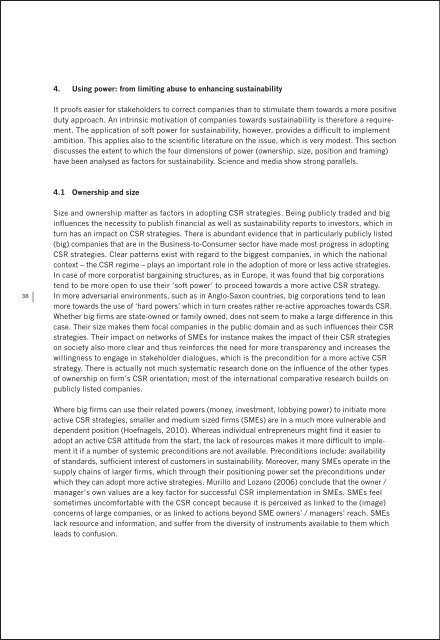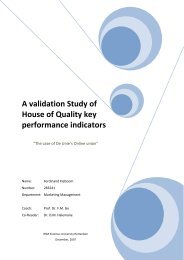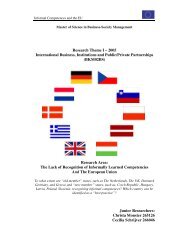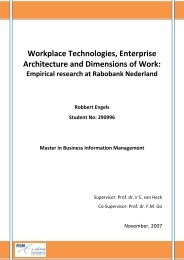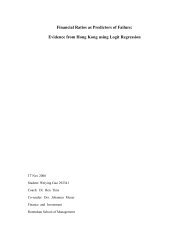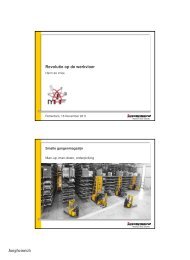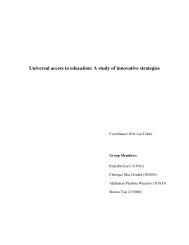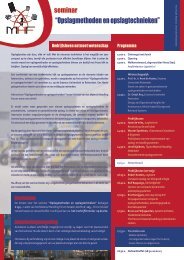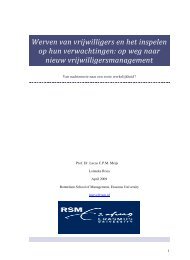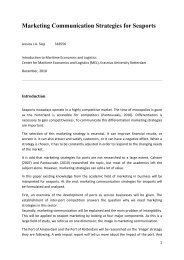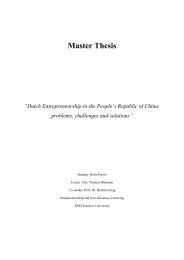Download With great power comes great responsibility (pdf) - ERIM
Download With great power comes great responsibility (pdf) - ERIM
Download With great power comes great responsibility (pdf) - ERIM
Create successful ePaper yourself
Turn your PDF publications into a flip-book with our unique Google optimized e-Paper software.
38<br />
4. Using <strong>power</strong>: from limiting abuse to enhancing sustainability<br />
It proofs easier for stakeholders to correct companies than to stimulate them towards a more positive<br />
duty approach. An intrinsic motivation of companies towards sustainability is therefore a require -<br />
ment. The application of soft <strong>power</strong> for sustainability, however, provides a difficult to implement<br />
ambition. This applies also to the scientific literature on the issue, which is very modest. This section<br />
discusses the extent to which the four dimensions of <strong>power</strong> (ownership, size, position and framing)<br />
have been analysed as factors for sustainability. Science and media show strong parallels.<br />
4.1 Ownership and size<br />
Size and ownership matter as factors in adopting CSR strategies. Being publicly traded and big<br />
influences the necessity to publish financial as well as sustainability reports to investors, which in<br />
turn has an impact on CSR strategies. There is abundant evidence that in particularly publicly listed<br />
(big) companies that are in the Business-to-Consumer sector have made most progress in adopting<br />
CSR strategies. Clear patterns exist with regard to the biggest companies, in which the national<br />
context – the CSR regime – plays an important role in the adoption of more or less active strategies.<br />
In case of more corporatist bargaining structures, as in Europe, it was found that big corporations<br />
tend to be more open to use their ‘soft <strong>power</strong>’ to proceed towards a more active CSR strategy.<br />
In more adversarial environments, such as in Anglo-Saxon countries, big corporations tend to lean<br />
more towards the use of ‘hard <strong>power</strong>s’ which in turn creates rather re-active approaches towards CSR.<br />
Whether big firms are state-owned or family owned, does not seem to make a large difference in this<br />
case. Their size makes them focal companies in the public domain and as such influences their CSR<br />
strategies. Their impact on networks of SMEs for instance makes the impact of their CSR strategies<br />
on society also more clear and thus reinforces the need for more transparency and increases the<br />
willing ness to engage in stakeholder dialogues, which is the precondition for a more active CSR<br />
strategy. There is actually not much systematic research done on the influence of the other types<br />
of ownership on firm’s CSR orientation; most of the international comparative research builds on<br />
publicly listed companies.<br />
Where big firms can use their related <strong>power</strong>s (money, investment, lobbying <strong>power</strong>) to initiate more<br />
active CSR strategies, smaller and medium sized firms (SMEs) are in a much more vulnerable and<br />
dependent position (Hoefnagels, 2010). Whereas individual entrepreneurs might find it easier to<br />
adopt an active CSR attitude from the start, the lack of resources makes it more difficult to imple -<br />
ment it if a number of systemic preconditions are not available. Preconditions include: availability<br />
of standards, sufficient interest of customers in sustainability. Moreover, many SMEs operate in the<br />
supply chains of larger firms, which through their positioning <strong>power</strong> set the preconditions under<br />
which they can adopt more active strategies. Murillo and Lozano (2006) conclude that the owner /<br />
manager’s own values are a key factor for successful CSR implementation in SMEs. SMEs feel<br />
sometimes uncomfortable with the CSR concept because it is perceived as linked to the (image)<br />
concerns of large companies, or as linked to actions beyond SME owners’ / managers’ reach. SMEs<br />
lack resource and information, and suffer from the diversity of instruments available to them which<br />
leads to confusion.<br />
There are three main reasons for SMEs to engage in CSR: the management’s value and belief system,<br />
legal obligations and strategic reasons in particular the use of CSR as an entry strategy. From the<br />
manager’s values and beliefs and related entry strategies, SMEs can obtain independent <strong>power</strong>.<br />
The second – legal – reason is the prime reason why so many SMEs have adopted a relatively in-active<br />
or re-active stance towards CSR (Cambra-Fierra et al., 2008). The third motive explains for the<br />
finding of Udayasankar (2008) that ‘both very small and very large firms are likely to participate more<br />
in CSR initiatives, whereas mid-sized firms will have the least participation’. He proposes that the<br />
combi nation of three attributes (firm visibility, resource access and scale of operations) has the<br />
particular U-shaped impact on CSR engagement.<br />
The ‘business case’ for CSR with SMEs is difficult to make, because of their more limited influence<br />
over the external environment and stakeholders (Hoefnagels, 2010). On a case to case basis authors<br />
have found business cases, but they are difficult to generalise (Singh et al. 2005; Moore and Manring,<br />
2009). Successful business for SMEs has been linked to the use CSR as an entry strategy: by appealing<br />
to customers, they can break through the <strong>power</strong>ful position of dominant players in particular markets.<br />
The instant success of the Body Shop, Ben& Jerry’s ice cream or of trade marks like as Max Havelaar<br />
can be explained by their ability to appeal to this niche market that wants to pay a premium for more<br />
sustainable products. The <strong>power</strong> of entry furthermore puts pressure on existing producers. The entry<br />
strategy, however, is often niche market strategy. It proofs difficult to surpass the 5% market position.<br />
The latter seems only possible with the active backing of already <strong>power</strong>ful actors in the supply chain.<br />
The Body Shop and Benn&Jerry’s were ultimately taken over by more <strong>power</strong>ful core companies in<br />
their respective chains (L’Oreal and Unilever). Whether their impact on sustainability has increased or<br />
decreased after they lost their independence remains to be seen. SMEs, finally, are standard takers,<br />
not standard setters / makers. Codifications are important factors in the spread of CSR, which<br />
imposes a particular type of dependency on SMEs that is different from bigger companies.<br />
Paradoxically, however, this can also have positive effects on the transition towards sustainability.<br />
SME’s owners / managers might be inactive, but can be forced by the big players in the field (i.e.<br />
MNEs) to do business in a socially responsible way. For example, regarding ISO 9000 and ISO 14001<br />
standards, ‘many influential organisations adopted the standard, despite the fact that ISO<br />
9000/14000 are voluntary and not a mandatory directive. This in turn forced others (directly or<br />
indirectly) to adopt ISO standards’ (Brunsson and Jacobsson, 2000). ‘Research into the diffusion of<br />
ISO 9000/14000 standard demonstrates that the role of multinational networks here is crucial (…).<br />
The diffusion mechanisms usually involve contractual requirements imposed by multinationals, the<br />
industry or key players in the value chain’ (Castka and Balzarova, 2007b). And ‘big corporations (…)<br />
are urging suppliers to adopt ISO 9000 standards’ (Henkoff, 1993, cited in Ragothaman and Korte,<br />
1999).<br />
4.2 Positioning <strong>power</strong><br />
There exists limited systematic research on the relationship between the horizontal positioning strategy<br />
of companies and the consequences for their CSR strategy. This is particularly surprising for the retail<br />
industry, since strategy and format in this industry is all about positioning (Bleijenbergh, 2010). Only<br />
Hughes (2005) notes, that retailers aimed at the middle or lower end of the market are less active in<br />
their membership of the Ethical Trading Initiative (ETI) and are less willing to invest time and money<br />
in relationships with their suppliers. He assumes that their customer base is apparently lacking interest<br />
39


